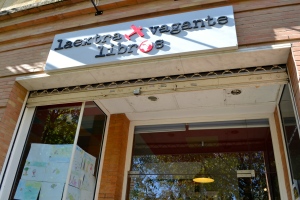Written by Natalie Locke, Associate Director of Aynah
The northern part of Spain is cold and I didn’t want to be on trains for too long (#boring). Thanks for reading.
Okay, there’s a bit more to it than that.
A quick Google search of cooperatives in Spain pulls up links about Mondragon exclusively, at least on the first page. More specific searches of various cities in Spain, at least the larger ones like Barcelona and Madrid, will give you links to the cooperative federations around the country and some information about their cooperative futbol clubs.* With this information alone, I built a plan centered around a couple federation visits in Barcelona and Madrid and a couple of days to visit Mondragon.
On my first day walking around Barcelona, I stumbled upon this bookstore. A seven-person worker cooperative selling books and other resources on social justice and social change, plus trainings and workshops on cooperative business, including tours of cooperatives in various neighborhoods around Barcelona (#everythingiwant). Language barriers (#Catalan) prevented me from getting all the information I would have liked from the woman working at the bookstore. I also couldn’t find my way to the tour they were leading for this reason. When I mentioned my intended visit to Mondragon, she raised her eyebrows. “They export some of their labor to India so they’re not operating totally locally. Capitalist economy and cooperative economy don’t work together,” she said. She suggested that there were other co-ops to visit all over the country, if that’s what I wanted to do.
It was at this point that I cut Mondragon out of my travel plans. Why travel so far and so long to see one co-op when there’s a strong culture of cooperation in the rest of the Spain, too?
Folks at FAECTA in Sevilla informed me that worker cooperatives accounts for 13% of the economy in Andalusia, the southernmost autonomous community in Spain. Tourism accounts 12%. Women make up 50% of the worker owners in these cooperatives and there is even an organization supporting the intersection of the feminist economy and the cooperative economy, working under FAECTA. There is also a huge push to get more youth in co-ops in order to sustain the movement, and the folks at FAECTA recommended this book for more information about young cooperators worldwide (#coopyouth!). In regards to Mondragon, they said, “They market themselves well so they’re widely acknowledged, but cooperative culture is actually much richer and more widespread in the south.” For example, the commitment to local, organic food in Granada has sparked an agricultural cooperative movement in southeastern Spain. Las Torcas has 25 producer members in various climates in the region so they can provide fresh produce to their customers year round. In addition to CSA shares and farmers markets, they sell to cooperative buyer clubs, which keep prices low for consumers, and profit higher for producers. Olive oil producers, both conventional and organic, in the region have adopted this way of thinking too. La Flor, which shares many members with Las Torcas, informed me that most olive oil producers in Spain form cooperatives because the equipment is too expensive to buy alone. By cooperating, they cut out the middle man, once again keeping prices reasonable and profits at a maximum.
For example, the commitment to local, organic food in Granada has sparked an agricultural cooperative movement in southeastern Spain. Las Torcas has 25 producer members in various climates in the region so they can provide fresh produce to their customers year round. In addition to CSA shares and farmers markets, they sell to cooperative buyer clubs, which keep prices low for consumers, and profit higher for producers. Olive oil producers, both conventional and organic, in the region have adopted this way of thinking too. La Flor, which shares many members with Las Torcas, informed me that most olive oil producers in Spain form cooperatives because the equipment is too expensive to buy alone. By cooperating, they cut out the middle man, once again keeping prices reasonable and profits at a maximum.
Avoiding the logistical nightmare of transit on rural mountain roads meant I missed out on this cooperative community of 2700 people. The nature of this community makes me wonder how the loose constitution in Spain, which accommodates a multi-lingual culture and the development of autonomous communities (#17), might be supporting a more cooperative culture. That one of the ICA’s cooperative principles is ‘Autonomy and Independence’ does not seem like a coincidence in this context.
I would still like to visit Mondragon and will put energy into making it happen the next time I am in Spain (#Aynahtrip?). I am most interested in how it fits in the context of cooperatives nationwide. I only scratched the surface of the cooperative sector in this varied country and am anxious to learn more about what treasures are buried deeper. Certainly Mondragon is a fascinating example of cooperation on a large scale, but to let the largest and best marketed organization become the face of cooperation for a whole country is to lose sight of the amazing work being done by smaller groups of passionate, dedicated people.
*The futbol fan ownership is actually really rad. I don’t have a good excuse for not finding out everything about that and going to a game to cheer for cooperative sports. #oops.

